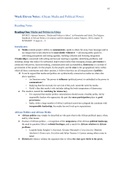85
Week Eleven Notes: African Media and Political Power
_______________________________________________________________
Reading Notes
Reading One: Media and Politics in Africa
SOURCE: Adetutu Omotoso, “Media and Politics in Africa”, in Oloruntoba and Falola, The Palgrave
Handbook of African Politics, Governance and Development (London: Palgrave, 2018), chapter 33.
SUMMARY: 12 pages to ~ 6
Introduction
● Media extends people’s ability to communicate, speak to others far away, hear messages and to
see images that would otherwise be unavailable without it → advancing public goals by
cultivating perceptions and setting agendas, building cohesion and fostering integration
If leadership is concerned with setting and not just reacting to agendas, identifying problems, and
initiating change that makes for substantial improvement rather than managing change, governance is
connected with power, decision-making, communication and accountability, democracy is a system of
government of the people, for the people, by the people; and the state is the geographical entity within
which all these constituents and others operate, it follows that they are all integral parts of politics.
➔ It can be argued that media and politics are symbiotically connected as media too share sthe
above qualities.
○ As Omotoso notes “the power to influence (political power) is embedded in the power to
communicate”.
○ Implying that the necessity for survival of the polis raised the need for media.
○ Ocitti’s idea that media’s role includes taking the body temperature of democracy.
● The media is named the watchdog for democracy
○ It is expected that media–politics interrelations should create a healthy polity, led by
responsible leaders who appreciate the part that mass participation plays in good
governance.
○ Sadly, while a large number of Africa’s political actors have plagued the continent with
irresponsible leadership, the media has not lived up to expectations.
African Politics and African Media
● African politics may simply be described as who gets what in the African political space, when,
and by what means.
● Essense of African politics → recognition of the uniqueness of the African political landscape,
the need to question Africa’s colonial heritages, and a search for African solutions to African
problems.
○ Leopold Sedar Senghor’s Negritude, Kwame Nkrumah’s Consciencism, Obafemi
Awolowo’s Democratic Socialism and Julius Nyerere’s Ujamaa among others come to
mind.
● Historical evidence validate the argument that in Africa the state gave birth to the press.
, 86
○ Colonial governments initiated both print and broadcast media in Africa to serve
colonialist expansion, African nationalism, palliative treatment for the natives,
colonialist federalism, capitalist expansion, and missionary activity.
● Since the struggle for independence between the early 1920s and the 1960s, to the period of
“second liberation” characterized by a clamor for political change (1980s and 1990s) the media
has played vital roles in African politics.
○ Jomo Kenyatta, Nnamdi Azikiwe, Tom Mboya, Harry Thuku, and Obafemi Awolowo
among other nationalist leaders established various publications aimed at reaching out
to citizens and sensitizing them about political, social, and economic developments.
● At a national level (government and its people): communication and information platforms are
explored in the pursuit of political objectives. Here, both politics and media are more
inward-looking, with a strong commitment to state patriotism and internal affairs.
● At a regional level: states with shared socio-cultural and geographical links find common
ground to deal with their political, economic, and communication challenges and prospects.
→ The Economic Community of West African States (ECOWAS)
→ the Southern African Development Community (SADC)
● Continental analysis presents a Pan-African disposition for development issues that is
anchored by bodies including the African Union (AU) and the New Partnership for African
Development (NEPAD) among others.
○ Media attempts toward continental integration are presented by organizations such as the
Pan African News Agency (PANA) and the Union of African National Radio and TV
Organizations (URTNA).
○ Here it is believed that African integration will be a success story if it can strengthen its
regional institutions with a view to benefiting from the gains of globalization, as obtained
in other continents.
★ At each level of analysis, political issues more often culminate in media issues, which are
recycled, thus turning media issues into political issues for the masses to deal with in their
various capacities.
● Unfortunately, stakeholders in African politics and African media fail to delineate between
private and public spheres, national and regional spheres, and continental and global spheres,
often displaying internal issues to global audiences, thus increasing chaos on the continent.
As illustrated…
● National level: media constructions that frame individuals' minds on how to view their nation.
● Regional level: how leaders of states question the essence of any integration and note the massive
deficit in terms of political will for an integration agenda amongst states in each region.
● Continental level: African media and politics embed the media within societal (continental)
pathologies, within which the vision of a United States of Africa is pursued such that the
continent begins to speak with one voice to the world.
● Global media, which is primarily constituted by Western media and committed to shaping
global politics and presents itself as the most viable in telling the whole story owing to its human
and technological access to global events.




